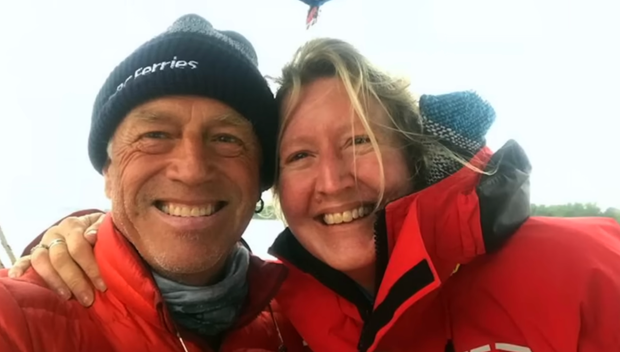CBS News
Dead couple washes ashore in life raft, prompting Canada police investigation

Canada’s national police force is investigating the deaths of two sailors whose bodies washed ashore earlier this month on a raft in Nova Scotia.
One of the sailors was identified this week as a 70-year-old man from British Columbia who set sail in early June for a planned tour across the Atlantic in his yacht, the Theros, the Royal Canadian Mounted Police said Monday. While they continued working to confirm the second sailor’s identity, investigators were confident that she was the other person known to have been on board the yacht when it left Halifax Harbor for the Azores on June 11, according to police. His sailing partner was a 54-year-old woman, also from British Columbia, they said.
Both sailors had been reported missing on June 18.
Although law enforcement didn’t publicly name either of them, an apparent family member identified the couple as James Brett Clibbery and his wife, Sarah Justine Packwood, in a social media post shared three days after the bodies washed ashore on July 10. The post was shared by a man who said Clibbery was his father and whose name is also James Clibbery. (The elder James Clibbery appeared to go by his middle name, Brett, based on the vlogs that he and Packwood used to regularly film and publish on their YouTube channel, called Theros Adventures in reference to their yacht.)
“The past few days have been very hard. My father James Brett Clibbery , and his wife, Sarah Justine Packwood have regrettably passed away,” the younger James Clibbery said in the July 13 post. “There is still an investigation, as well as a DNA test to confirm, but with all the news, it is hard to remain hopeful.”
The sailor’s son described his father and Packwood as “amazing people” and said “there isn’t anything that will fill the hole that has been left by their, so far unexplained passing.”
Theros Adventures/YouTube
The pair were found dead in a 10-foot inflatable boat that had washed up onto the beaches of Sable Island, the Royal Canadian Mounted Police said. Sable Island is a small protected island in the North Atlantic, almost 200 miles from Halifax on the Nova Scotian coast. Investigators believe that the inflatable was a life boat once attached to the larger Theros yacht.
Canadian police said investigators do not believe their deaths were “suspicious in nature.”
“Investigators from the Royal Canadian Mounted Police/Halifax Regional Police Integrated Criminal Investigation Division continue to gather information and analyze evidence in an effort to determine what may have occurred at sea,” police said.
One theory, from the Canadian news site Saltwire, suggested that a much bigger vessel struck and damaged the couple’s boat soon after they embarked on their trip from Halifax, forcing them to use the life raft. CBS News contacted the Royal Canadian Mounted Police for comment but did not receive an immediate response.
Clibbery and Packwood were avid travelers and sailors who over the last few years had documented various trips around the world together, including some massive sailing excursions, on their YouTube channel.
They teased their transatlantic voyage from Halifax in the months leading up to their departure. In one video, posted on their channel in early April, Clibbery explained that they’d made upgrades and mechanical adjustments to the Theros ahead of the then-upcoming sailing season. Those changes included installing an electric motor — they spoke often in earlier videos about reducing their carbon footprint — fixing six solar panels to the boat in order to charge the engine battery.
CBS News
Senate passes $895 billion defense bill with controversial gender-affirming care restriction

Washington — The Senate approved the mammoth $895 billion National Defense Authorization Act on Wednesday, despite concern from some Democrats over a controversial policy restricting gender-affirming care for children of servicemembers.
In a 85 to 14 vote, the Senate approved the legislation, which the House passed last week. Eleven Democrats and three Republicans voted against it in the upper chamber. The bill now heads to President Biden’s desk for his signature.
The 1,800 page national security legislation to authorize funding for the Defense Department for fiscal year 2025. But the bill includes a handful of controversial policies, like the gender-affirming care restriction, and lost support from the majority of Democrats in the House.
The Democratic-controlled Senate pushed forward with the measure nonetheless. Senate Majority Leader Chuck Schumer noted that while the NDAA “isn’t perfect,” it still “includes some very good things that Democrats fought for” — citing provisions aimed at standing up against the Chinese Communist Party, boosting the use of artificial intelligence for national defense and expanding domestic tech innovation.
“Congress has passed the NDAA on a bipartisan basis for over six straight decades, and this year will be no different,” Schumer said ahead of the vote on Wednesday. “We’re passing the NDAA and that’s a very good thing.”
Andrew Harnik / Getty Images
Sen. Ed Markey, a Massachusetts Democrat, derided the gender-affirming care restriction earlier this week, calling it “the product of a nationwide campaign against trans rights” and arguing that the legislation’s approval would mark “the first anti-LGBTQ law passed by Congress in decades.”
Still, the outcome of the vote was all but guaranteed after the Senate advanced the measure on Monday in a 83-12 procedural vote.
Sen. Roger Wicker of Mississippi, the ranking Republican on the Senate Armed Services Committee, celebrated the NDAA’s “immense accomplishments,” including a 14.5% pay raise for junior service members and investments in recruitment capabilities. But he said Congress “missed an opportunity to strengthen the president-elect’s hand as he takes office in a precarious world situation.”
Wicker outlined that the Armed Services Committee proposed $25 billion for modernization programs, including for missile defense, ship building and counter-drone technology, saying “this should have been part of the bill today.”
Sen. Jack Reed, a Rhode Island Democrat who chairs the Armed Services Committee, called the legislation a “strong, forward looking bill that we can all be proud of.” But he said he “strongly” disagrees with the inclusion of the gender-affirming care provision, calling it a “misguided provision.”
“I share many of my colleagues’ frustrations that the bill includes a provision that would prohibit gender-affirming health care for minors under certain circumstances,” Reed noted, adding that he voted against the provision in committee. “We will continue to work to ensure the health care rights of all military personnel and their dependents.”
CBS News
Trump wants Herschel Walker to be U.S. ambassador to the Bahamas

Watch CBS News
Be the first to know
Get browser notifications for breaking news, live events, and exclusive reporting.
CBS News
CDC confirms first severe bird flu case in the U.S.

A person in Louisiana has the first severe illness caused by bird flu in the U.S., the Centers for Disease Control and Prevention announced Wednesday.
Officials determined the patient had exposure to sick and dead birds in backyard flocks, though an investigation into the source of the infection in the state is ongoing. This is also the first case of H5N1 bird flu in the U.S. that has been linked to exposure to a backyard flock, a news release noted. Officials have not shared details on the patient’s symptoms.
The case was first confirmed by health officials Friday, adding to the total of 61 reported human cases of H5 bird flu reported in the United States. Another severe case of H5N1 has been reported in a teen in British Columbia.
A release from the Louisiana Department of Health Wednesday added the patient, a resident of southwestern Louisiana, is currently hospitalized. Until now, the H5N1 cases in the U.S. have been mild, including conjunctivitis and upper respiratory symptoms.
“While the current public health risk for the general public is low, people who work with birds, poultry or cows, or have recreational exposure to them, are at higher risk,” the state’s health department added.
Mild illnesses have been seen in dairy and poultry workers who had close contact with infected animals. In two cases, no known source of the illnesses have been identified, which has worried infectious disease experts about the possibility of human-to-human transmission, which could trigger a pandemic.









